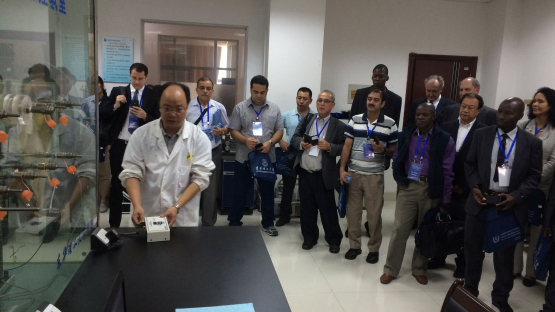The increased costs associated with having to dig deeper for ore and growing public concern with mining activities are among the global challenges facing the mining industry. These challenges also affect the extraction of uranium ore, the raw material for nuclear fuel.
“As the use of nuclear energy increases, so too will the need for uranium production, conversion, enrichment and fuel fabrication. Uranium production will start in several countries with limited nuclear experience and know-how,” said Harikrishnan Tulsidas, scientific officer with the IAEA Department of Nuclear Energy. “Member States need to be well informed about all aspects of uranium production involving exploration, mining and milling and to have a well-managed uranium extraction programme.”
Through training and facilitating knowledge sharing among experts and practitioners from Member States, the IAEA supports the development of sustainable uranium production cycles.
Robust management procedures for uranium mining play a vital role. This was one of the themes discussed at a leadership academy programme held in August, co-hosted by the IAEA and the Chinese Government through the East China University of Science and Technology. Participants examined ways and means to strengthen internal operational mechanisms to improve the economic and environmental sustainability of uranium mining. Digging deeper to get uranium requires a well-integrated and coordinated programme among all stakeholders.
Since attending this workshop, Cassius Chiwambo, a senior mining engineer at Malawi’s Ministry of Mining and Environment explained what he has gained: “We learnt that even though each uranium mining project is unique in its own way, there are a set of overarching sustainability principles and management approaches that should guide each project. These include the three ‘R’ concepts – ‘recovery, reuse, and recycle’, as well as ‘comprehensive extraction’ and ‘zero waste’.”
There is an initiative to start a new national programme on uranium and radioactive minerals, he said. “We are going to introduce the ‘spider web collaboration’ concept in our country. It involves stakeholders at all levels, across disciplines to strengthen the uranium mining industry, to build capacity as well as have focused training so that we are up to international standards.”
The establishment of a network of competent, socially, environmentally and economically responsible technical and scientific experts greatly reduces the risk of misconceived projects, said Hesheng Liu, Professor and President of the East China University of Technology in Nanchang. “The IAEA’s initiative in organizing a leadership academy programme is clearly a step in the right direction,” he said.
Worker safety and care for the environment
Some concerns that impact the mining industry are connected to the safety of workers and the efficient use of technology. Where uranium mining is involved, the safe and secure management of the radioactive residues and the remediation of the mining and milling sites during and after operations require intensive tracking and monitoring.
“Uranium mining can also be an expensive process if not planned and managed from the beginning and long term programmes need to be developed instead of short term benefits,” said Tulsidas. This means, that the financial plans should also include mine closure and remediation, which should be progressively addressed during the life cycle of the operation.
Tackling remediation only after the end of the operations can drastically increase the costs. Avoiding remediation activities until end of mine life can potentially result in leaving behind a legacy that can have implications for society and for governments to ‘clean up’ the residual uranium.
Another potential problem is that other elements in the ore such as gold, copper, silver or rare-earths slip through the cracks as waste material. This valuable loss of revenue needs to be prevented through closer collaboration among mine operators, Tulsidas said. Efficient extraction of uranium and all other possible co-products vastly reduces the amounts of waste, so is not only economically more viable but also environmentally more sustainable.
The water used during the extraction process can also be recycled after treatment.
Intensifying global cooperation
The IAEA has been proactive in raising awareness about safe and secure procedures during uranium mining operations. It holds regular meetings and workshops with Member State experts to share best practices in the complete uranium cycle and also to highlight operational challenges.
“Working to establish a more effective collaborative network among the stakeholders, across disciplines and countries lies at the heart of building a global capacity to make this happen,” said Tulsidas.
We are going to introduce the ‘spider web collaboration’ concept in our country. It involves stakeholders at all levels, across disciplines to strengthen the uranium mining industry



